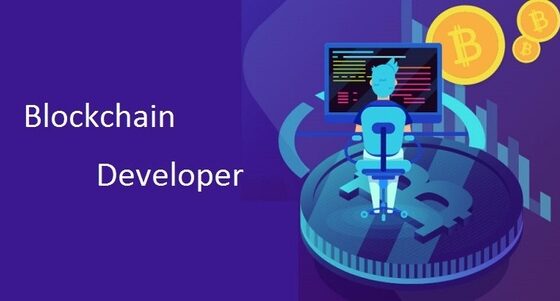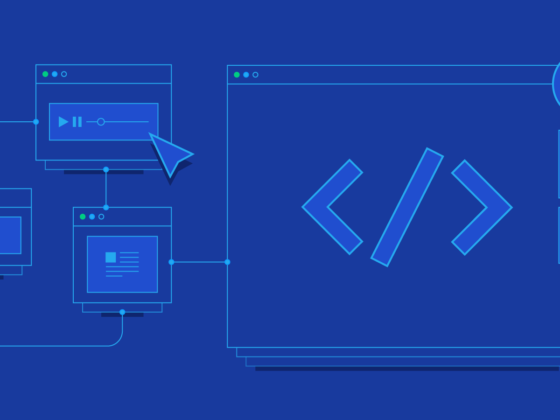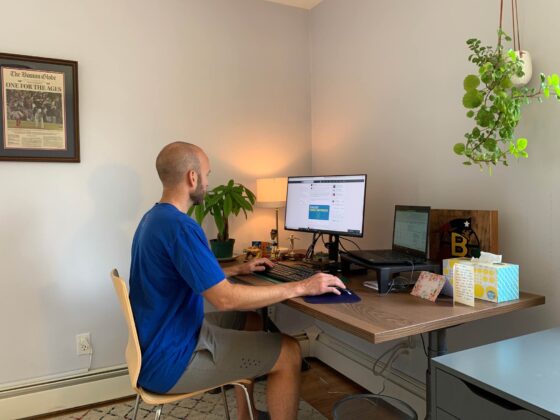If you’re an aspiring professional looking for tips into how to become a web developer, this quick guide is for you. Whether you’re looking to enter the field of web development as a complete beginner, are aiming for a career shift, or simply looking to advance your current level of expertise, the below steps can help you get ahead of the curve in this competitive field.
When it comes to the growth of the tech industry, the IDC projects the industry to exceed $5.3 trillion in 2022. This means that the web development job market will continue to boom, and if you’re one of those looking to enter the field, then knowing how to become a web developer is a must.
What is web development?
Before we go on about the steps you can take towards becoming a web developer, let’s first define what web development is. In simple terms, web development makes up the work involved in developing a website. This work can range from things like developing a simple static page of plain text to complex web applications, electronic businesses, and social network services.
A web developer’s primary task is to take a web design and turn it into a website. This is done by writing lines of code, using different programming languages.
Web development types
Full-Stack Developer:
A full-stack developer is expected to develop and deploy both the front end and the back end elements of a website, an application, or a computer program. Full-stack developers work alongside a range of other functions in a company, like UX/UI designers and web designers.
Front-End Developer:
Front-end web developers work alongside back-end web developers, implementing all the visual and audio elements required for a web design — and incorporating them into a web format. Building effective web products and developing responsive user experiences are also at the forefront of a front-end web developer’s duties.
Back-End Developer:
Back-end web developers are responsible for both building and maintaining everything related to the back-end of a website — from a server and application code to a database. They collaborate with key team members like front-end developers, system administrators, web designers, software engineers, as well as customers, to create effective web and mobile applications.
What are the duties of a web developer?
Full-Stack Developer
Duties: Some responsibilities of a full-stack web developer revolve around converting the elements of web designs into executable code, coding the server-side elements of a web product, working with different programming languages and technologies to develop websites, web applications, or computer programs, testing and modifying web products or software, and more.
In addition, full-stack developers can get ahead of the game by researching industry trends and developments in the digital tech world to help further advance their career and keep up with all the trends.
Average salary: $105,868+
Front-End Developer
Duties: Front-end web developers are responsible for key things when it comes to web and mobile development and computer programming. They are the ones responsible for designing and editing websites or web applications, developing code that translates design wireframes into visual elements of a web product, optimizing front-end elements for scalability in areas such as loading speed and performance, and more.
Front-end web developers are also required to collaborate effectively with UI/UX designers, web designers, back-end developers and hosting services to create an end-product that paves way for a successful user experience.
Average salary: $100,323+
Back-End Developer
Duties: Some of the main responsibilities of a back-end developer include optimizing speed, efficiency, and scalability of web/mobile applications, designing, implementing, and maintaining database storage for these applications, writing, debugging, and documenting code that runs on the web server, and more.
Some of these responsibilities vary, depending on every specialist’s educational background, work experience, and skills of course.
Average salary: $96,038+
How to become a web developer: 5 steps
- Learn fundamentals: As an aspiring web developer, the first thing you can do is to start learning the fundamentals of web development. This includes understanding of HTML (Hypertext Markup Language), CSS (Cascading Style Sheets), and JavaScript. Coding bootcamps are a great way for those wanting to learn web development and step foot in the field. One of the many advantages of coding bootcamps is that they are short, immersive, and there’s a lot of focus on job outcomes and help with employment.
- Choose a specialization: Once you’ve gotten the gist of web development fundamentals, the next step is to pick a specialization and advance your learning in it. As noted earlier, there are three types of web development: full-stack development, front-end development, and back-end development. Each carries different tasks and responsibilities, so do your homework to know which specialization best suits your goals.
- Learn a programming language: Regardless of which web development specialization you choose, you need to know a couple of programming languages to be considered a well-rounded web developer. The three most common programming languages used for web development are HTML, CSS, and JavaScript.
- Practice: After you’ve gotten a grip on those three common programming languages used in web development, you’ll be ready to build projects. While doing so, you’ll gain as much web development experience as you can and build on your skill set.
- Build your portfolio: While building projects, be sure to include them in a portfolio of yours that you can keep adding to. This should exemplify your strongest projects because you’ll need a strong portfolio when it’s time to network and apply for jobs as a web developer.
Where to learn web development
If you’ve decided that you need to further enhance or begin your education in web development, you may want to consider the below coding bootcamp options. As mentioned earlier, coding bootcamps are among the best ways to step foot in a tech career. Not only are they short, immersive, and in-par with industry trends, but a good coding bootcamp will also prepare its students for the real world by mentorship programs and help with employment.
- Nucamp: Offering online, part-time, and self-paced learning formats, Nucamp’s coding bootcamp covers all the basics of web development for beginners and more advanced professionals.
Approximate cost: $1,480 to $1,880
Duration: 17-22 weeks
- Flatiron School: Flatiron’s programs provide an immersive, outcomes-driven curriculum for aspiring web developers, looking to launch a career in web development.
Approximate cost: $16,900
Duration: 9-15 weeks
- DigitalCrafts: DigitalCrafts offers full-time and part-time online bootcamps in web development, along with a variety of others.
Approximate cost: $13,950 (full-time), $9,500 (part-time)
Duration: 16 weeks (full-time), 24 weeks (part-time)
- Northwestern Coding Bootcamp: Located in Chicago, IL, Northwestern Coding Bootcamp covers web development.
Approximate cost: $10,000
Duration:12 weeks (full-time), 24 weeks (part-time)
- Devmountain: Offering both full-time and part-time formats, Devmountain’s coding bootcamp provides students with an immersive experience in web development.
Approximate cost: $4,900 to $9,900
Duration: 6-16 weeks
- Thinkful: Thinkful’s online bootcamp offers both full-time and part-time courses in web development.
Approximate cost: $15,499 to $16,950
Duration: 12 weeks
- The Tech Academy: The Tech Academy offers full- and part-time courses in web development, either online or on-site in Portland, OR.
Approximate cost: $7,974 to $26,640
Duration: 8-22 weeks
In a word
So now you know all the basics on how to become a web developer. This exciting field is continuously booming, as more and more web and mobile applications are being built daily to meet user/consumer demands. In order to stand out as a web developer in this ever-changing and competitive field, you need to invest your time, energy, and money towards an education that’s worth it. Even though there are a ton of free online resources that cover web development, remember that most of these will simply provide you with the basics.
To fully grasp the concepts of web development and know the programming languages used within web development, it’s best to fully immerse yourself in a coding bootcamp or a college degree. Not only will you graduate as a professional web developer, but you’ll also likely make lifelong connections that may help you land your first gig. Before choosing a coding bootcamp, it’s critical to stick to one that matches your budget and goals. What often makes coding bootcamps an attractive option for students is that they take less time to complete, helping students get access to the industry in less time.
As noted earlier, coding bootcamp options vary from one school to another, and while most of them do offer full-time, part-time, or online options, they sometimes differ in the range of courses they offer. The majority focuses on teaching programming languages like HTML, JavaScript, Python, etc. that train students to become successful web developers.










